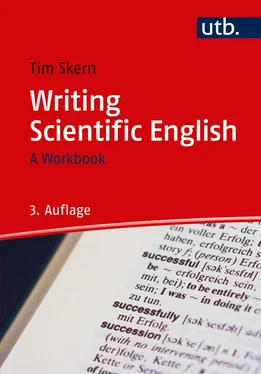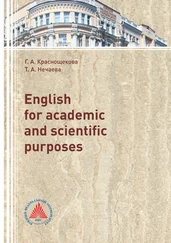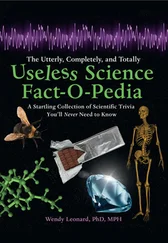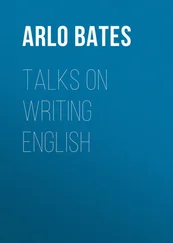(Bekanntlich sind die Sprachen, namentlich in grammatischer Hinsicht, desto vollkommener, je älter sie sind, und werden stufenweise immer schlechter – vom hohen Sanskrit an bis zum englischen Jargon herab, diesem aus Lappen heterogener Stoffe zusammengeflickten Gedankenkleide.)
ARTHUR SCHOPENHAUER
The chapter begins by looking at the advantages and disadvantages of English as the language of scientific communication, presents some guidelines on how to write the formal English found in scientific writing and ends by suggesting a basic vocabulary for written scientific communication.
1.1Advantages and disadvantages of English
English has become today's language of science through historical events, not through any inherent characteristics that make it better suited to the task. Fortunately, English does have many positive characteristics that make it suitable for scientific writing. However, some negative ones also make it less than ideal. The positive characteristics include a relatively straightforward grammar and an enormously rich vocabulary; the irregular pronunciation and the inconsistent spelling are two negative ones.
The straightforward grammar makes it relatively simple to construct sentences. The order of words is uncomplicated and there is no need to worry about the gender of nouns or about the appropriate ending of an adjective. Changes in the verb endings are also limited. Nevertheless, it is the verbs, with their large number of tenses, that do cause the most difficulty in applying English grammar.
English's richness of vocabulary gives writers a tremendous flexibility in the words they can choose. Where does this wonderful richness of vocabulary originate? One source lies in English's French, German and Scandinavian roots. As a consequence, English often has both a French- and a German-based word for the same thing or concept. The pairs of words “infancy” and “childhood”, “judicious” and “wise”, “malady” and “sickness” and “transmit” and “send” are just a few examples. A second source of variety in English is the habit of English-speaking people to absorb words from other languages. For instance, the word “robot” originates from the word in many Slav languages for work; in contrast, the words “alcohol” and “elixir” have an Arabic origin. The excellent website www.krysstal.com/borrow.htmllists the hundreds of words that English has assimilated over the centuries. Schopenhauer was quite correct in describing English as a patchwork language.
In his book “Mother Tongue: The English Language”, Bill Bryson states that this richness ofvocabulary gives English an advantage over many other languages. He proposes that a language with a wider vocabulary has more ways to express the same thought. This may be true, but a wide vocabulary is not necessary to express one's ideas. The writer Ernest Hemingway was famous for using a limited range of words. Nevertheless, he was still able to articulate powerful emotions and describe profound thoughts.
The two negative characteristics of English mentioned above do, however, place it at a distinct disadvantage compared to other languages. The irregular and often seemingly perverse pronunciation means that even native English speakers will have no idea how to pronounce a word with which they are unfamiliar. How difficult is it then for non-native speakers to learn to pronounce English correctly? How can one explain that the important scientific words “mature” and “nature” are pronounced differently? How could a young person who had lived for a year in Hollywood as a teenager and who spoke English with an excellent American accent mispronounce the words “nitrogen” and “oxygen”? These two gases are not normally words that teenagers frequently use. Without having heard their pronunciation, it is hard to know that they rhyme with Ben and not with bean. This book is, however, only concerned with writing. A discussion on the vagaries of pronunciation can wait for another day.
Spelling is, in contrast, essential for accurate scientific writing. It is vital that students are aware of the problems. The most frequent ones are presented in box 1.1, with suggestions how a famous native German speaker might terminate them. Perhaps these changes will one day become reality. Until then, spelling will remain an item to be considered carefully in scientific manuscripts. One way of reducing the difficulties is to switch on a spellchecker and set it to correct when typing. Special words or abbreviations that are specific to a particular field can be constantly added to the main dictionary. In this way, the spellchecker can be trusted to correct spelling during typing. If it cannot correct a word, then that word will need attention. If you do not like your spellchecker to make decisions itself, turn off this option and manually check the words marked by the spellchecker. There is nothing wrong with this; you may even learn something. It is simply more time-consuming.
A spellchecker is, however, not perfect. At present, a spellchecker will fail to determine whether a word should be written in the singular or plural. Furthermore, it cannot deal with words that do exist in a language but that are used incorrectly. The thirteen sentences in box 1.2provide twelve such words. See if you can find them. Remember to keep an eye open for such errors when you read your work.
The grammar checker of Word 2019 is also a useful tool. It detects repeated words, sentences that do not start with a capital letter and unnecessary spaces. Its range also extends to more complex difficulties such as highlighting incomplete sentences, marking a lack of agreement between the subject and verb (e. g. “the majority of scientists is conservative”, not “the majority of scientists are conservative”) and highlighting incorrect tense constructions.
Like spellcheckers, grammar checkers are not foolproof and are to be used with care. Nevertheless, even if they are inaccurate, you still have to work out why the grammar checker has queried your writing. Anything that makes you contemplate what you have written and consider other possibilities will positively contribute to the quality of your text.
Box 1.1Terminating difficulties in English spelling
This text lists most of the peculiarities of English spelling and offers some humorous suggestions to eliminate them. The text circulated by email at the time of ex-Governor Schwarzenegger's inauguration and can still be found in many internet forums. I am grateful to the anonymous author. Read it out aloud to hear how it sounds!
A New Language For California
The new Californian Governor has just announced an agreement whereby English will be the official language of the state, rather than German, which was the other possibility. As part of the negotiations, the Terminator's Government conceded that English spelling had some room for improvement and has accepted a 5-year phase-in plan that would become known as “Austro-English” (or, perhaps even better, “Austrionics”). In the first year, “s” will replace the soft “c”. Sertainly, this will make the sivil servants jump with joy. The hard “c” will be dropped in favour of the “k”. This should klear up konfusion, and keyboards kan have one less letter. There will be growing publik enthusiasm in the sekond year when the troublesome “ph” will be replaced with the “f”. This will make words like fotograf 20% shorter. In the 3rd year, publik akseptanse of the new spelling kan be expekted to reach the stage where more komplikated changes are possible. Governments will enkourage the removal of double letters which have always ben a deterent to akurate speling. Also, al wil agre that the horibl mes of the silent “e” in the languag is disgrasful and it should go away. By the 4th yer peopl wil be reseptiv to steps such as replasing “th” with “z” and “w” with “v”. During ze fifz yer, ze unesesary “o” kan be dropd from vords kontaining “ou” and after ziz fifz yer, ve vil hav a reil sensibl riten styl. Zer vil be no mor trubl or difikultis and evrivun vil find it ezi tu understand ech oza. Ze drem of a united urop vil finali kum tru. If zis mad yu smil, pleas pas it on to oza pepl.
Читать дальше












